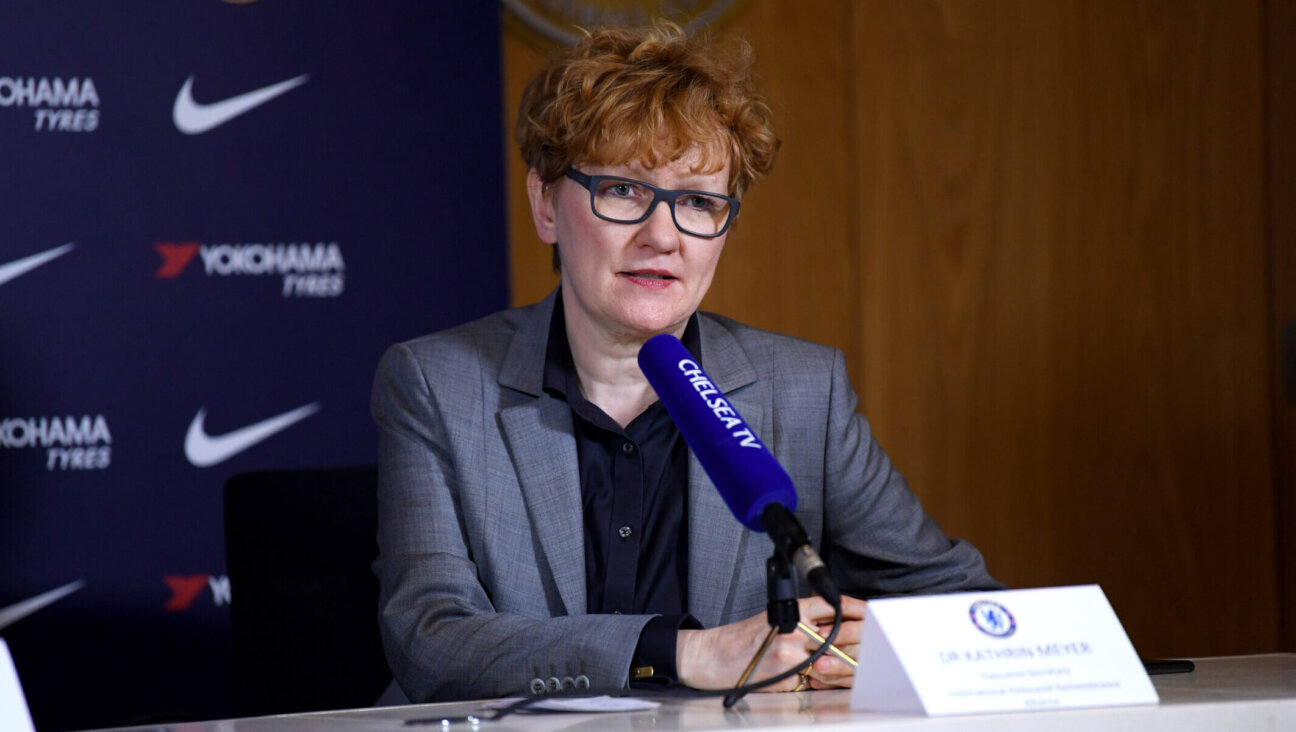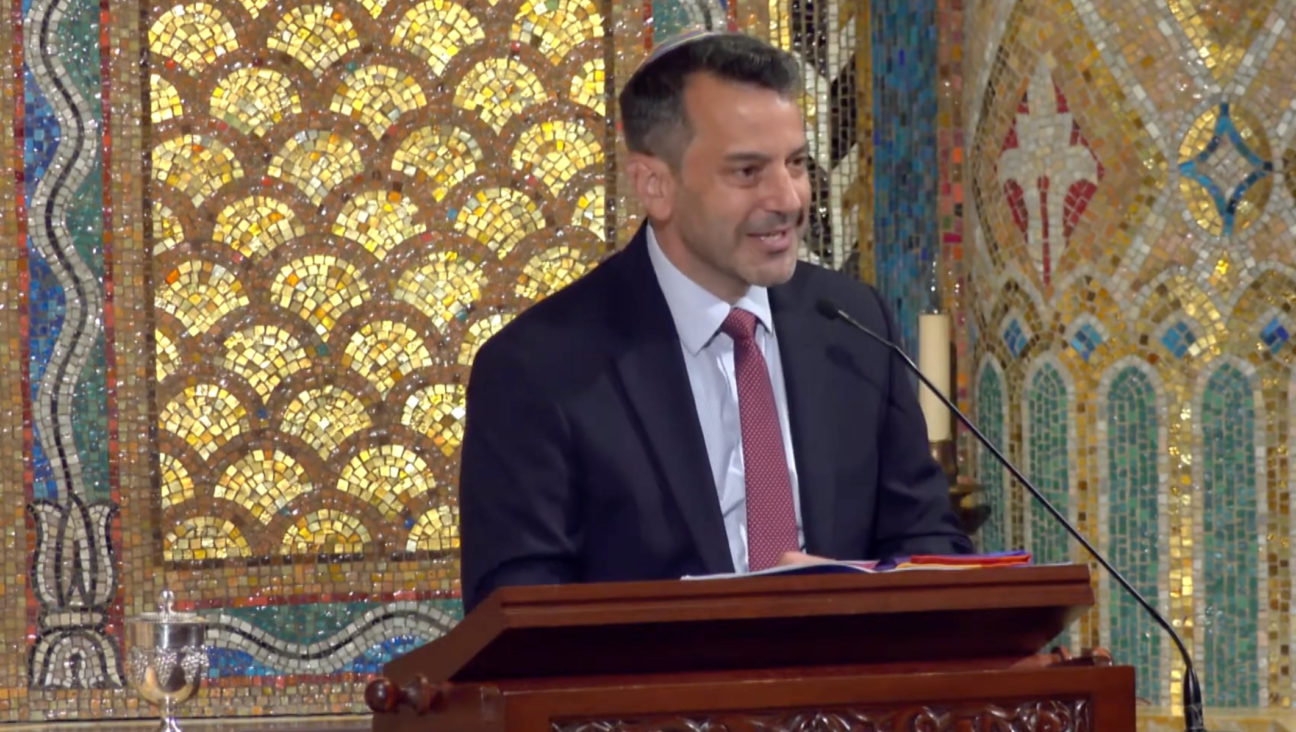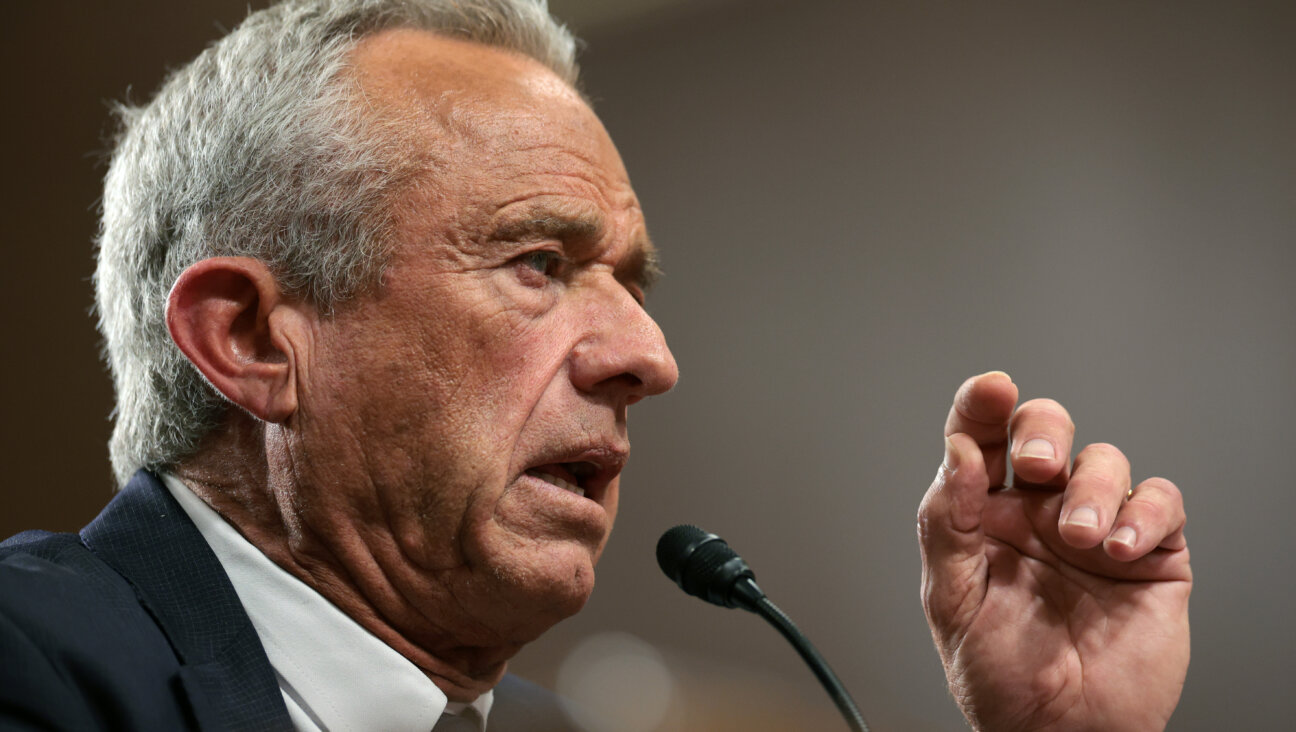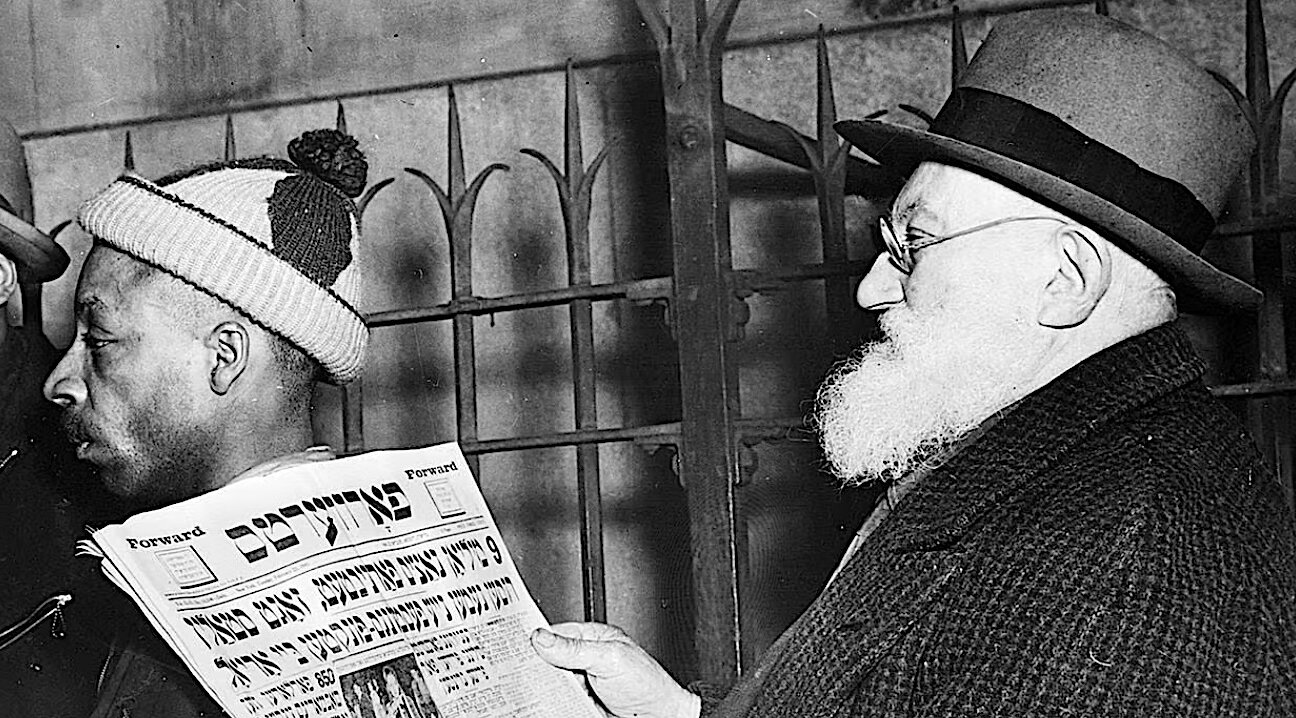Was Battle Against Iran Deal a Noble Crusade — or Epic Flop?

Image by Getty Images
The TV ads attacking the Iran nuclear deal are still being aired in dozens of states, voters are still organizing congressional call-ins and hundreds of top pro-Israel activists still plan to fly into Washington for a last-minute push when Congress returns from recess.
But the fight is over.
With Senator Barbara Mikulski’s September 2 announcement that she will back the Iran nuclear deal, President Obama now has the votes he needs to sustain a veto of any move by Congress to disapprove the controversial agreement.
That spells the end of the largest and most expensive pro-Israel campaign in American history, one that placed Jews in an uneasy position on the frontlines against the president’s top foreign policy priority.
Now, the community is starting to weigh the gains and losses of this historic mobilization. Some believe the writing was on the wall from the beginning—that forcing President Obama out of the agreement was a pie in the sky goal. Others say it was a noble fight and the money was well-spent in that it built a stronger political base.
“It was misguided,” said philanthropist Charles Bronfman, who also chairs the Israel Policy Forum’s advisory committee. “From the get-go it seemed that those who were against the deal are going to lose, so the question is, why get into this fight and spend so much money?“
The effort did little to move the political needle. While public opinion has shifted, according to polls, to a more skeptical approach toward the Iran deal, politicians have hardly budged on Capitol Hill, where a two-thirds majority in both houses will be needed to overturn the agreement when the vote takes place in mid-September.
“Where is the lobbying machine? What did all that money buy?” asked Steve Rosen, a former top lobbyist for the American Israel Public Affairs Committee. “This is a very bad moment for AIPAC.”
But AIPAC is far from being ready to call it quits. “In poll after poll,” said the lobby’s spokesman, Marshall Wittmann, “the American people reject this flawed agreement, and we are confident that so will a strong and growing bipartisan majority in Congress.”
At Beth Tfiloh, an Orthodox synagogue in Pikesville, Maryland, AIPAC leaders tried on September 1 to energize supporters for one more push aimed at Ben Cardin, their U.S. senator, who is a member of this synagogue.
“Take out your phones,” AIPAC’s executive director, Howard Kohr, urged more than 1,000 activists packing the sanctuary. Kohr rarely speaks to mass audiences outside of AIPAC’s annual policy conference. But here he appealed to the audience personally. He asked those in attendance to write down the phone numbers of the House and Senate switchboard and make sure to call their representatives first thing in the morning.
“We know already that a bipartisan majority in the House and the Senate are against this deal,” Kohr said. “Unfortunately you need more than a simple majority; that’s why we’re pushing for more.”
David Zukerberg, a local resident who attended the AIPAC event, vowed to show his anger personally should Cardin back the deal. “I’ll donate money to whoever runs against him,” he threatened, “and I’ll actively support whoever runs against him.”
The pro-Israel lobby, second in political influence to only the gun lobby and the senior citizens’ political advocacy groups, has found itself in a bind. It faced, on the one hand, an Israeli government determined to go all out to stop the deal and to demand the same of its supporters. On the other hand, an American administration that was willing to muster its full political power to ensure the passage of its key foreign policy achievement.
AIPAC chose to go full force against the deal, despite the slim political chance of winning. “When a president is dead set on a foreign policy initiative, it’s virtually impossible to stop him, and the sophisticated people at AIPAC understand that,” said Neal Sher, who was the lobby’s executive director from 1994 to 1996. “But the Netanyahu administration has come out so forcefully that I’m not sure AIPAC had that much of a choice.”
As a result, AIPAC launched the most expensive foreign policy advocacy campaign in recent history. Citizens for a Nuclear Free Iran, a subsidiary group the lobby established, was immediately able to secure a reported campaign chest of up to $40 million, though Patrick Dorton, the group’s spokesman, put the sum at about half of that.
This money, all deployed in the compressed period between the deal’s announcement in mid-July and the mid-September congressional votes, went primarily to TV ads in 40 states that sought to influence wavering lawmakers to oppose the deal. The campaign also included online ads targeting specific senators and representatives. AIPAC also conducted intense direct lobbying, from constituent pressure to high-level visits to Capitol Hill by major donors with close ties with lawmakers.
And that was not all. Opponents of the deal succeeded in getting a majority of Jewish organizations to join, with major players such as the American Jewish Committee and the Anti-Defamation League speaking out against it. An additional push came from 21 Jewish federations across the country that called on their members to lobby against the agreement.
But results were limited. As the congressional summer recess drew to a close, it became clear that the campaign moved few votes to the opposition column. The biggest achievement was convincing New York Senator Charles Schumer to oppose the deal. But despite his leadership position in the Senate and his standing in the Jewish community, there was no “Schumer effect” that moved others, as advocates had hoped.
In launching its all-out campaign against all odds, AIPAC took a calculated risk. First and foremost, it risked losing the bipartisan image it has been struggling to maintain for decades. “It now becomes harder for them to say, ‘We’re no Republican organization,’” Rosen said, noting that AIPAC is in fact bipartisan and has made a point of keeping both Democrats and Republicans on its board.
AIPAC also risked taking a hit to its image as an omnipotent lobby ruling the Hill. Former Florida Democrat Robert Wexler told Newsweek that much of AIPAC’s power lies in the perception that it is the 800-pound gorilla in the room. “But if the 800-pound gorilla challenges and loses, then the deterrence factor is seriously weakened,” Wexler said.
Still, history has shown AIPAC willing to take these risks at times, and thus far it has emerged stronger even after losses.
During the Reagan presidency, AIPAC sought to block the sale of advanced surveillance airplanes known as AWACS to Saudi Arabia, an adversary of Israel. AIPAC, at the time a young organization, launched what was its biggest battle and eventually lost when Congress approved the deal. Still, the lobby’s donations grew, and it gained recognition as a political force to be reckoned with.
The second major battle took place in 1991, when president George H. W. Bush conditioned a $10 billion loan guarantee to Israel on freezing building in West Bank settlements. The Israeli government, led by Yitzhak Shamir, refused, and AIPAC took to Congress to fight against the condition. This led Bush to famously describe himself as “one lonely little guy” fighting the powerful pro-Israel lobby. AIPAC lost this battle, too, but once again suffered no adverse consequence.
Fundraising, in fact, leaped upward after each incident, as it did following the 2007 publication of a book by prominent political scientists Stephen Walt and John Mearsheimer that critically depicted the pro-Israel lobby. Fundraising also increased after the arrest of two of the group’s top lobbyists on espionage charges that were later dropped, and following the formation of AIPAC’s dovish rival, J Street.
AIPAC now has an enormous $110 million budget and has launched a five-year plan to double it.
Insiders foresee no financial hit for AIPAC. Those opposed to the deal, an official with a major Jewish organization said, will appreciate the effort and keep on supporting the lobby, and those undecided will also likely maintain their support. “They’re not going to go over to J Street,” the official said, explaining that for the centrist and hawkish pro-Israel crowd, AIPAC is the only option.
A bigger issue is the damage, if any, to the lobby’s political clout. But if history offers any clue about the future, the lobby will emerge unscathed, mainly because of the administration’s reluctance to take revenge on a still formidable organization.
Tom Dine, who was AIPAC’s executive director from 1980 to 1993, argued that it was a mistake to campaign for breaking an international agreement to which the United States has signed on. Still, Dine, who supports the Iran deal, does not see any negative consequences for the lobby.
“You fought the good fight, and now you move on,” said Dine, who directed the lobby’s battle against the AWACS sales. “I don’t think AIPAC will lose access or power, but they won’t come out stronger now, because they were tied at the hip to [Benjamin] Netanyahu on this.”
AIPAC’s close ties with the Israeli government, on display throughout this period, could raise a different problem for the organization. According to Sher, critics may claim that these close ties define AIPAC legally as a “foreign agent” of Israel under the federal Foreign Agents Registration Act. This would require it to register with the Justice Department and to put activities under heightened government scrutiny. “I hope the people there are cognizant about the foreign registration requirements,” Sher said.
Many questions about AIPAC’s clout following the congressional vote will become clear when the administration engages with Israel and its supporters on the increased security package it has promised Israel. Obama and Secretary of State John Kerry made clear in conversations with members of Congress that the administration will be very generous in addressing Israel’s security needs once the Netanyahu government is willing to sit down and talk.
But while walking such political minefields is AIPAC’s bread and butter, the Jewish philanthropic federations that joined the campaign face a different reality. The federations, by nature nonpolitical and consensus oriented, took a big step out of their comfort zone by joining the campaign.
Jacob Ukeles, a former top federation official who now has his own consulting firm, noted what the feeling would be in most cases: “You don’t want to take a position that could alienate parts of your donor base.”
But Barry Shrage, president of the Combined Jewish Philanthropies of Greater Boston, the first major federation to announce its opposition to the deal, argued that there is no price to pay for speaking out against the administration, even if the congressional battle is ultimately lost. “It’s a tragedy that it turned into a political issue,” Shrage said. “Our board had to follow its heart about this. Why are we here if we start making political calculations on what is right and what is wrong?”
Unlike AIPAC, federations are not likely to cash in on their decision to enter the fray. But most believe they will not face a major loss of donors who were opposed to the move, nor will they find closed doors when seeking cooperation with Democratic local and national elected officials. “In general, winners are magnanimous,” Ukeles said, “so there won’t be any negative reaction from the executive branch or from the federal government.”
Nor do most of those involved in Jewish philanthropy expect the millions spent on the Iran campaign to drain any money from the Jewish community’s total charitable giving. “It doesn’t work that way,” Bronfman said. “The money given for fighting the deal won’t come at the expense of anything else.”
Contact Nathan Guttman at [email protected] or on Twitter @nathanguttman
A message from our Publisher & CEO Rachel Fishman Feddersen

I hope you appreciated this article. Before you go, I’d like to ask you to please support the Forward’s award-winning, nonprofit journalism so that we can be prepared for whatever news 2025 brings.
At a time when other newsrooms are closing or cutting back, the Forward has removed its paywall and invested additional resources to report on the ground from Israel and around the U.S. on the impact of the war, rising antisemitism and polarized discourse.
Readers like you make it all possible. Support our work by becoming a Forward Member and connect with our journalism and your community.
— Rachel Fishman Feddersen, Publisher and CEO























